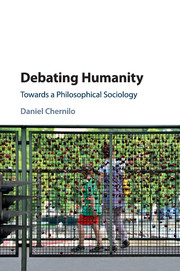Debating Humanity
Towards a Philosophical Sociology
Debating Humanity explores sociological and philosophical efforts to delineate key features of humanity that identify us as members of the human species. After challenging the normative contradictions of contemporary posthumanism, this book goes back to the foundational debate on humanism between Jean-Paul Sartre and Martin Heidegger in the 1940s and then re-assesses the implicit and explicit anthropological arguments put forward by seven leading postwar theorists: self-transcendence (Hannah Arendt), adaptation (Talcott Parsons), responsibility (Hans Jonas), language (Jürgen Habermas), strong evaluations (Charles Taylor), reflexivity (Margaret Archer) and reproduction of life (Luc Boltanski). Genuinely interdisciplinary and boldly argued, Daniel Chernilo has crafted a novel philosophical sociology that defends a universalistic principle of humanity as the condition of possibility of any adequate understanding of social life.
Daniel Chernilo is Professor of Social and Political Thought at Loughborough University. He has published over forty academic articles in leading scholarly journals and is author of A Social Theory of the Nation-State (2007) and The Natural Law Foundations of Modern Social Theory (Cambridge, 2013).



